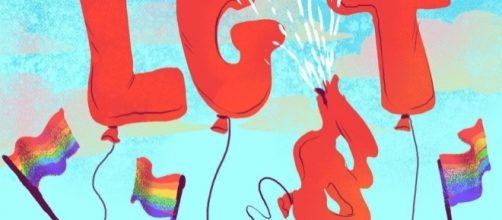The 'B' letter in LGBTQ+ is not there to be mocked, laughed at, or ignored; but unfortunately, it is. For those who don't know, the 'B' stands for Bisexuality. Recently, the CDC devised a survey that estimated how many men and women between the ages of 18-44 identified themselves as bisexual, rather than lesbian or homosexual. The poll found that 5.5% of women said they were bisexual, and 2% of men said the same; this is significantly higher than those who identify as another sexual orientation. However, this information is not really seen by the public and due to the stigma that surrounds this very real, and very legitimate identity, bisexual individuals still face discrimination today.
Coming to terms with your sexuality can often be a scary and confusing time for most people, which is why some find support from other people such as therapists and counsellors, rather than friends and family. Sadly, a study published by Columbia University Press published in 2007 confirmed that at least a quarter of these therapists refer their patients to seek medical and professional help for their bisexuality, as they diagnosed the orientation as being an illness. A further 6% tried to use conversion therapy to revert their patients back to heterosexuality, with another 4% telling them it was just a phase and must either become homosexual or lesbian.
It is because of this that bi-erasure still exists today, and is frequently portrayed unrealistically throughout the media, depicting bisexual individuals as mentally ill, incapable of being monogamous or, their characters are killed off.
This then feeds into the common misconceptions people have about bisexuality and its repercussions are becoming not only serious, but deadly.
Abuse and Domestic Violence
Another study conducted by the CDC proved that bisexual women are at a greater risk of intimate partner abuse more so than lesbian or heterosexual women. More than 61.1% of bisexual women had experienced some form of physical, mental and emotional abuse at one point in their lives, some of it escalating to rape, Domestic Violence and stalking. Overall, the statistics state that bisexual women are 2.6% more likely to be forcibly raped by a partner than a heterosexual woman, and 3.5% higher than a lesbian woman.
Due to this, 57.4% of bisexual women said they suffered from post traumatic stress disorder, resulting in a high risk of depression and anxiety.
Biphobia also furthers the abuse as some people believe these women are pretending to be bisexual for attention, which then results in factors such as sexual harassment, abuse and rape. Bisexual women are also hypersexualized and seen as more of a fetish than a human being, often being forced into sexual acts with more than one person because they are told, "this is what you want", again not only suffering from sexual abuse, but also emotional as they are being manipulated into something they don't want to do.
Because of the stigma that surrounds bisexuality, it is actively contributing to these women often not seeking emotional and physical support when they need it, in fear that people will turn them away.
Lack of support
In 2011, an investigation took place that monitored LGBTQ+ students and their well-being, the report showed that 44% of young bisexual students out of 13,000 teenagers had considered suicide with more than 21% making at least one attempt the previous year, this instantly placed them at a greater risk. This is due to the lack of community support in schools, colleges and other professional practices that do not have adequate knowledge about bisexuality, which in turn adheres to the bullying, and refusal to help when someone needs it the most.
Since this study, many celebrities and bisexual activists have used the hashtag #BiphobiaKills to raise awareness over the shocking number of youths, students and adults who do not receive any type of support in relation to their physical and mental health.
It's time we put an end to this.

